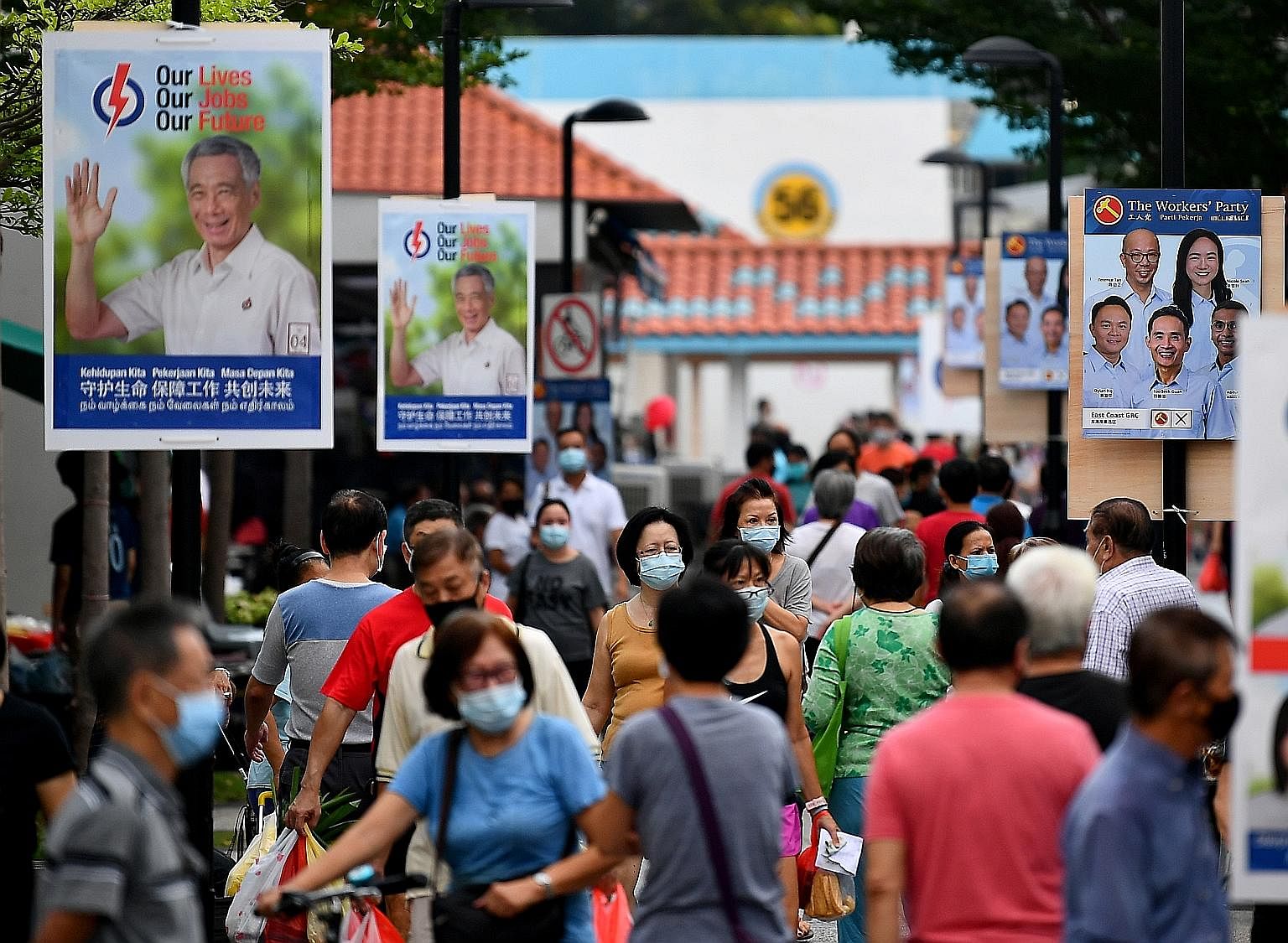This is shaping up to be one of the least emotive yet most intense election campaigns since the 1990s.
Least emotive, because of the absence of vitriol and emotional hammering of candidates. When personality issues emerged, they were quickly dealt with and candidates from both sides signalled they wanted to move on to focus on issues.
This happened when People's Action Party (PAP) candidate Ivan Lim, widely criticised online, was dropped; and when the PAP leaders crossed swords with Singapore Democratic Party leader Chee Soon Juan over the latter's charge that the Government had contemplated a 10 million population target.
The PAP released information and context that this was not true, demanded an apology that never came, and then contented itself with sharp remarks that it was "disappointed but not surprised" at Dr Chee's behaviour, "for we knew Dr Chee has not changed, cannot change and will never change".
Rather than focus on personalities, the campaign has dealt with issues. In part the more sober tone is due to the absence of physical rallies and their rabble-rousing effect.
Instead, what we are seeing, underneath the rhetoric, the charges levelled and the rebuttals, is a serious battle for the minds and hearts of the moderate voters in Singapore.
The Singapore electorate is often said to consist of 30 per cent staunch opposition voters and 30 per cent staunch supporters of the incumbent PAP, with a large pool of about 40 per cent of "swing voters".
Staunch PAP supporters include many older Singaporeans who lived the country's transformation from Third World to First; younger, well-travelled ones who appreciate the oasis of order that is Singapore; as well as new citizens who buy into the system. Many voters also support the candidate they like, so PAP MPs who have built a bond with their residents have an advantage over new candidates.
Staunch opposition supporters include those who want to see alternative voices in Parliament and those who feel unfairly treated by the Government, or who believe the PAP Government has become incompetent or self-serving, putting its own interests above that of ordinary citizens.
Then there are those who decide how to vote as every general election rolls around. This group does not buy into the PAP's argument that the vote should go to the party with the track record, the party you want to govern Singapore. Nor does it buy into the opposition's argument that voters should support any check and balance on the PAP.
Instead, among the swing voters are many who want a PAP government but will use their votes to vent their frustration at specific candidates or policies, or tactically to support quality opposition, and put pressure on the PAP.

The PAP's hardball tactics of partisan campaigning and character attacks have in the past turned off a portion of the swing voters each election. GE2020 has been notable for the relative absence of such tactics.
Instead, the party is treating voters as sensible, fair-minded adults to be appealed to, not as children to be bribed with constituency upgrading promises or wayward teenagers to be chided.
This was notable in the online Fullerton rally speech by Prime Minister Lee Hsien Loong yesterday. It continues a time-honoured political tradition, although the only thing "Fullerton" about this online rally, streamed live from the PAP headquarters, was that it took place at the usual lunchtime, and the way PM Lee reminisced about past rallies in the historic square.
Yesterday was possibly PM Lee's last Fullerton rally address. With it, he took viewers down memory lane, recalling how he first spoke there as a new candidate in 1984, and how the PAP had led the country out of the recession that hit months later.
His main message: Vote for the party with the track record that has "improved people's lives beyond measure" and renewed its leadership to be "vigorous and in sync with your aspirations".
He asked voters to give the PAP strong support during this critical period, amid a global economic and health crisis.
Singapore has to remain a special place with a strong government and united people. "Maintaining this high reputation is a matter of survival for us," he stressed.
Appealing directly to on-the-fence voters, he said: "Do not confuse signals by voting opposition if what you really want is a PAP MP to look after your constituency and town council, and a PAP government to look after Singapore."
He added: "Don't be taken in by those who say that it is important just to have more choices. Look carefully at the choices they offer you, ask yourself if they can deliver, don't be taken for a ride. Your future is at stake."
Such comments acknowledge Singaporeans' desire for an opposition, but appeal to them to make sure they support only candidates and parties that can deliver, but without running down specific candidates.
It isn't just the PAP that is fighting to win over moderate voters.
The Workers' Party (WP), the only opposition party in the last Parliament (with six seats), has moved swiftly to try to stem the loss of Chinese electoral support after its absence from a televised political debate in Mandarin. It held a hasty press conference on Sunday, where its youngest candidate Raeesah Khan, 26, standing in Sengkang GRC, apologised for insensitive past social media posts that, among other things, alleged that the police and courts favoured rich Chinese over minorities. The police are investigating her posts.
Opposition criticism of the Government's handling of Covid-19 has also been surprisingly constrained, pointing out what many commentators have already been saying for weeks: dropping the ball on migrant workers and being slow to mandate mask-wearing in public.
Instead, this campaign has been rich in ideas, with candidates talking about their parties' policy proposals in numerous talk shows and interviews online. The result is a rich buffet of serious content which voters can watch with full attention at home, in their own time.
Rather than debate merits of individual proposals, the PAP has used two standard lines of argument to counter them.
The first is to dismiss them as PAP-lite: suggesting they are copycats of the PAP's policies, especially as the PAP has, since 2011, expanded its redistribution programmes, introduced universal health coverage and significantly expanded childcare and home-based care subsidies.
However, this line of argument lends itself to easy counters. As Mr Leon Perera of the WP retorted, Singaporeans should then vote in WP MPs to help make sure the PAP introduces WP ideas into its agenda.
The second line of counter is to ask the opposition how it plans to fund its generous subsidies.
The parties have ready answers. The WP suggests "tapping no more than a fifth of the approximately $15 billion per year in land sales that the Government typically collects" or "increasing the Net Investment Returns Contribution (NIRC) by up to 10 per cent".
Up to 50 per cent of the NIRC from past reserves can now be used for government Budgets.
The Singapore Democratic Party proposes raising taxes on the rich and cutting ministerial salaries. The Progress Singapore Party wants to cut public spending and use more of the NIRC.
To appeal to the broad middle ground, the parties are careful not to come across as profligate. Spending more of the NIRC still leaves the reserves' principal untouched.
The net result is that the larger opposition parties' manifesto ideas are no longer dismissed as too radical or irresponsible for consideration; but considered as alternatives which can be debated. This is rather bad politicking, for it dignifies the opposition's ideas; but good for democracy, in treating opponents seriously and giving their views due consideration.
In thus acknowledging Singaporeans' desire for an opposition, the PAP has tried to seize the political initiative by making the Non-Constituency MP (NCMP) scheme a key part of its message: Vote PAP and you can still have opposition MPs in Parliament through this scheme, which allows up to 12 top losers into Parliament, with full voting rights on Bills.
Opposition candidates have countered that an NCMP's role is limited. WP's former leader Low Thia Khiang, who retires this election, famously compared NCMPs to duckweed - floating prettily on a pond, but devoid of roots. The NCMP can speak up in Parliament, but lacks constituency roots and town council responsibilities and resources.
WP's Mr Perera has also argued that voters are better off voting in the opposition, because then they get an opposition voice in Parliament, and the PAP candidate remains as grassroots adviser to get the promised government-funded constituency projects implemented.
With day eight of the campaign today, Singapore is heading into the final days of this rather unusual election, with its respectful tone and focus on ideas.
The incumbent PAP has to work doubly hard in the remaining hours to persuade voters to support the party with the track record, to emerge stronger in a post-Covid-19 world.
The opposition has to persuade voters that supporting the opposition will put pressure on the PAP to ensure that the future is better.
Which argument will win more support? It won't be an easy battle.

